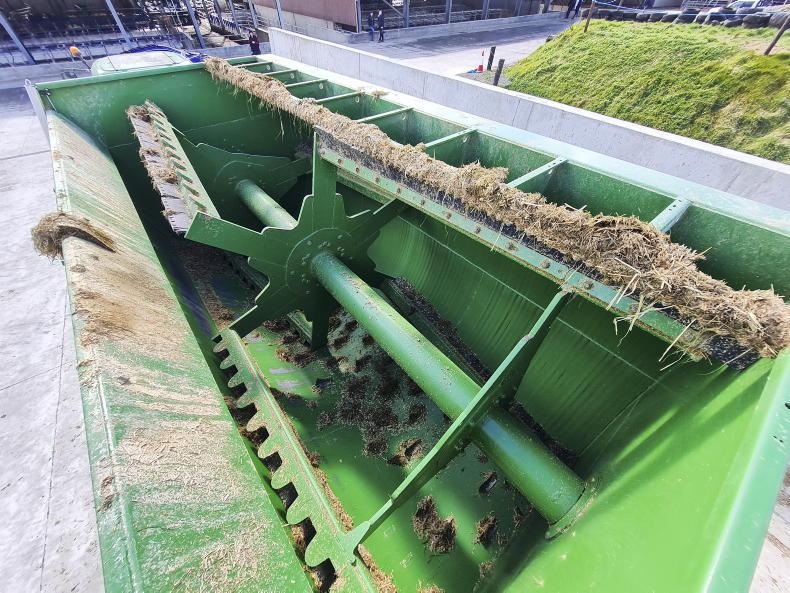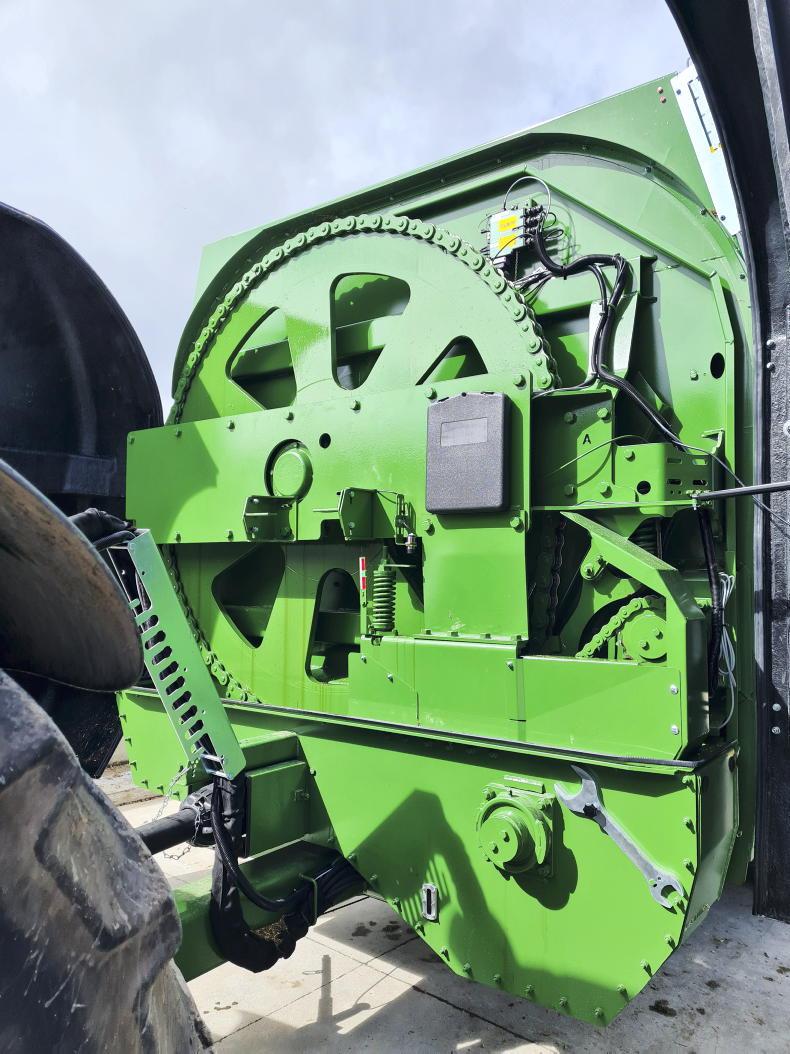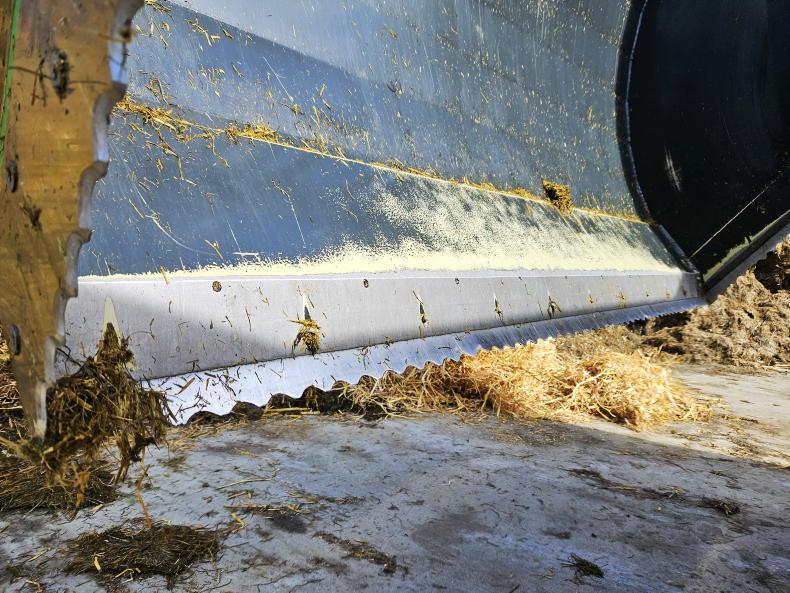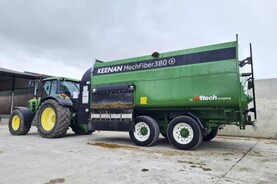Two years ago, Keenan updated its MechFiber+ range of paddle diet feeders, which came as a successor to its MechFiber lineup.
The Carlow manufacturer launched the updated range at an open day on the farm of David Clarke, better known as Cows.ie, near Mullingar. This was the first farm to take delivery of one of its updated machines. Having fed livestock every single day since it arrived on the farm two years ago, we travelled to the Midlands to find out how the machine has performed.

"The Triomaster does a great job to keep the pit face clean."
History with diet feeding
“We bought our first diet feeder 14 years ago. It was a 7m3 Trioliet single-tub feeder, which was branded as a Redrock machine. As the farm expanded, we then moved to a 14m3 Redrock and then onto a 24m3 Redrock twin-tub feeder. The Redrock feeders were reliable overall, but did give their own trouble”.
“A few years ago, we demoed a self-propelled Lucas diet feeder. It was an amazing machine, but it was too big. We have a decent yard with lots of room, but you’d need it all and more for this machine. With our livestock export business, we would be in a lot of farms throughout the country.
“We had a good look in the market place, and felt that the Keenan was one machine that was capable of providing a consistent mix quality, no matter whether it was a 1t or 9t load.
“This was the deciding factor for us. Oftentimes, we might only have to feed a small number of freshly calved cows at different times of the year, so having a machine with that flexibility was vital,” explained David Clarke.

The paddle castellations have been re-shaped to give a rounded top section, replacing the previous square type castellations.

The principal design of the machine carries through from the previous generation, with the main chain drive submersed in an oil bath.
What did Keenan update with the Mechfiber+?
The main update to the machine is the re-engineering of the paddle castellations. These have been re-shaped to give a rounded top section, replacing the previous square type castellations.
The rake angle has also been increased, which Keenan says is to allow greater material movement in the chamber. Keenan noted this change has resulted in less material residing on the paddles, which means less friction, less wear to the belly of the machine and a reduction in peak horsepower requirement by up to 10%.

"The feeder has worked away very smoothly for us, we are very happy with it."
The manufacturer has also made some external improvements in design. LED lights have been added, which shine on to the feed-out door to provide improved visibility during mix discharge.
A 400mm longer feed-out door for faster feed out times is now optional, while newly designed mudguards are also available.
A notable aesthetic change from the outset is the moulded black pin seal matt finish front covers, replacing the white covers – which many farmers often referenced as reflecting the light from the tractor in the dark. The body decals are now black, so too is the rear collapsible ladder.
The range comes with the latest fourth-generation Keenan Controller, feed management app and the InTouch dashboard. The new controller also has the option of including mechanical telematics such as oil levels, temperature, chain tension status and feed-out door sensor status for easier maintenance.

The steering axle makes it very maneuverable.
Machine design
The MechFiber380+ features Keenan’s bread and butter design, retaining the paddle-mixing system. The principal design of the machine carries through from the previous generation of feeders, with the main chain drive submersed in an oil bath.
Keenan says this has now been simplified, from both a build and maintenance point of view.
The mixing chamber is made up of a six-paddle reel with the new style paddle castellations, which Keenans says is less demanding on power. Having previously tried out the smaller MechFiber 365, Ciaran Dowdall, the farm manager, would agree that the new model is easier to drive.

The machine requires three spool valves.
All internal body blades are located within the main body of the machine, between the five and seven o’clock positions, which the manufacturer says increases chopping ability without increasing the power requirement.
This particular machine has just one feed out door, but more can be specified.
How’s it performing?
With two full years of feeding under its belt, the team at Cows.ie are very impressed with its performance. The MechFiber 380+ is a 24m3 paddle machine, and is being ran on a John Deere 6630. Feeding over 600 livestock at peak times, the feeder has been used every day since it arrived on the farm.
To quantify this, an average load holds 8-9ts of feed and it’s being used to feed out six to seven loads daily during the winter months.
“The 6630 is a standard 130hp non-remapped tractor, and it’s working the feeder perfect, but it is near its limit, it wouldn’t handle any bigger of a feeder. But for a feeder of its size, it is easy to drive. The feeder has worked away very smoothly for us, we are very happy with it. The only mechanical issue it gave was a keyway fell out of one of the drive sprockets and it slipped a chain. But in fairness, this was a quick fix. In terms of wear and tear, no mechanical parts have been replaced, only the knives,” explained Ciaran.

The stainless steel knife on the Triomaster.
“At the beginning of this winter’s feeding, we put in a full set of knives. We use a mixture of wagon silage and precision-chop silage on the farm. The longer chop of the wagon silage is definitely harder on the knives, it stresses the knives more and will break them.
“Similarly, we are finding a lot of stones in straw is causing knife breakages. Depending on the mix, the tractor is using one to two tanks of diesel each week. Interestingly, we found that the tractor will use in the region of 50-75% more fuel mixing the wagon silage in comparison with the precision chop silage,” added Ciaran.
InTouch system
An influential part of the buying decision was the manufacturer’s feed management app and its InTouch platform. Keenan says the system allows farmers to measure, monitor and manage feed accuracy and efficiency, herd performance, feed costs, dry matter intake and refusals.
Through the app/machine-mounted controller, it gives guidance on the loading order and quantity of ingredients to be loaded for a consistent mix.
Keenan says up to 199 diets can be pre-programmed into the controller. Its Wi-Fi function allows the user to duplicate the screen on their phone/tablet for easy monitoring.
Adjustments to diets can be made on the go, through the app, and will then be synced to the Controller. The optional Instant Revolutions and AutoStop functions mean users can prevent the over- or under-processing of ration ingredients to ensure a consistent TMR.
“The InTouch system is a serious job.
“As we trade a lot of livestock, the number of heads we feed everyday can vary. We have six different diets logged on the system, and through the app, we key in the current number of heads for each, and it tells us the exact amount of each feed we need to load into the feeder to achieve the correct mix.
“It gives us great peace of mind, without having to spend too much time thinking about it,” explained Ciaran.
Trioliet silage cutter
In a bid to speed up the diet feeder loading process, the team at Cows.ie made the move to a new 4.1m3 Trioliet S300 silage cutter last year.
Known as the Triomaster, the manufacturer says with its geometry, the stationary knife is in the optimum radial position over the entire cutting curve, so the silage is sheared with minimum effort and without moving it. It says this leaves the remaining pit unaffected and the silage is not compressed, vibrated or pulled loose, or lifted as with many existing silage cutting systems.
To limit the risk of self-heating, the cutting depth is offered at 45cm, meaning the pit face is kept fresh. Weighing in at 2,150kg, it has a working width of 2.21m. The closed bucket design means handling loose products isn’t a problem.
The standard Triomaster S comes with a U-shaped cutter frame on a closed bucket, two hydraulic knife cylinders with an electric monitoring system and replaceable hardened stainless-steel knives. A weighing system is offered as an optional extra.
“We are very impressed with the Triomaster. It allows us to load the same volume of silage into the diet feeder in one third of the runs and time compared to our previous shear grab.
“It’s also a great job to keep the pit face clean. It’s very easy on the feeder, as it lets the silage out gradually in layers, rather than in one block. It’s a super job,” says Ciaran.
Two years ago, Keenan updated its MechFiber+ range of paddle diet feeders, which came as a successor to its MechFiber lineup.
The Carlow manufacturer launched the updated range at an open day on the farm of David Clarke, better known as Cows.ie, near Mullingar. This was the first farm to take delivery of one of its updated machines. Having fed livestock every single day since it arrived on the farm two years ago, we travelled to the Midlands to find out how the machine has performed.

"The Triomaster does a great job to keep the pit face clean."
History with diet feeding
“We bought our first diet feeder 14 years ago. It was a 7m3 Trioliet single-tub feeder, which was branded as a Redrock machine. As the farm expanded, we then moved to a 14m3 Redrock and then onto a 24m3 Redrock twin-tub feeder. The Redrock feeders were reliable overall, but did give their own trouble”.
“A few years ago, we demoed a self-propelled Lucas diet feeder. It was an amazing machine, but it was too big. We have a decent yard with lots of room, but you’d need it all and more for this machine. With our livestock export business, we would be in a lot of farms throughout the country.
“We had a good look in the market place, and felt that the Keenan was one machine that was capable of providing a consistent mix quality, no matter whether it was a 1t or 9t load.
“This was the deciding factor for us. Oftentimes, we might only have to feed a small number of freshly calved cows at different times of the year, so having a machine with that flexibility was vital,” explained David Clarke.

The paddle castellations have been re-shaped to give a rounded top section, replacing the previous square type castellations.

The principal design of the machine carries through from the previous generation, with the main chain drive submersed in an oil bath.
What did Keenan update with the Mechfiber+?
The main update to the machine is the re-engineering of the paddle castellations. These have been re-shaped to give a rounded top section, replacing the previous square type castellations.
The rake angle has also been increased, which Keenan says is to allow greater material movement in the chamber. Keenan noted this change has resulted in less material residing on the paddles, which means less friction, less wear to the belly of the machine and a reduction in peak horsepower requirement by up to 10%.

"The feeder has worked away very smoothly for us, we are very happy with it."
The manufacturer has also made some external improvements in design. LED lights have been added, which shine on to the feed-out door to provide improved visibility during mix discharge.
A 400mm longer feed-out door for faster feed out times is now optional, while newly designed mudguards are also available.
A notable aesthetic change from the outset is the moulded black pin seal matt finish front covers, replacing the white covers – which many farmers often referenced as reflecting the light from the tractor in the dark. The body decals are now black, so too is the rear collapsible ladder.
The range comes with the latest fourth-generation Keenan Controller, feed management app and the InTouch dashboard. The new controller also has the option of including mechanical telematics such as oil levels, temperature, chain tension status and feed-out door sensor status for easier maintenance.

The steering axle makes it very maneuverable.
Machine design
The MechFiber380+ features Keenan’s bread and butter design, retaining the paddle-mixing system. The principal design of the machine carries through from the previous generation of feeders, with the main chain drive submersed in an oil bath.
Keenan says this has now been simplified, from both a build and maintenance point of view.
The mixing chamber is made up of a six-paddle reel with the new style paddle castellations, which Keenans says is less demanding on power. Having previously tried out the smaller MechFiber 365, Ciaran Dowdall, the farm manager, would agree that the new model is easier to drive.

The machine requires three spool valves.
All internal body blades are located within the main body of the machine, between the five and seven o’clock positions, which the manufacturer says increases chopping ability without increasing the power requirement.
This particular machine has just one feed out door, but more can be specified.
How’s it performing?
With two full years of feeding under its belt, the team at Cows.ie are very impressed with its performance. The MechFiber 380+ is a 24m3 paddle machine, and is being ran on a John Deere 6630. Feeding over 600 livestock at peak times, the feeder has been used every day since it arrived on the farm.
To quantify this, an average load holds 8-9ts of feed and it’s being used to feed out six to seven loads daily during the winter months.
“The 6630 is a standard 130hp non-remapped tractor, and it’s working the feeder perfect, but it is near its limit, it wouldn’t handle any bigger of a feeder. But for a feeder of its size, it is easy to drive. The feeder has worked away very smoothly for us, we are very happy with it. The only mechanical issue it gave was a keyway fell out of one of the drive sprockets and it slipped a chain. But in fairness, this was a quick fix. In terms of wear and tear, no mechanical parts have been replaced, only the knives,” explained Ciaran.

The stainless steel knife on the Triomaster.
“At the beginning of this winter’s feeding, we put in a full set of knives. We use a mixture of wagon silage and precision-chop silage on the farm. The longer chop of the wagon silage is definitely harder on the knives, it stresses the knives more and will break them.
“Similarly, we are finding a lot of stones in straw is causing knife breakages. Depending on the mix, the tractor is using one to two tanks of diesel each week. Interestingly, we found that the tractor will use in the region of 50-75% more fuel mixing the wagon silage in comparison with the precision chop silage,” added Ciaran.
InTouch system
An influential part of the buying decision was the manufacturer’s feed management app and its InTouch platform. Keenan says the system allows farmers to measure, monitor and manage feed accuracy and efficiency, herd performance, feed costs, dry matter intake and refusals.
Through the app/machine-mounted controller, it gives guidance on the loading order and quantity of ingredients to be loaded for a consistent mix.
Keenan says up to 199 diets can be pre-programmed into the controller. Its Wi-Fi function allows the user to duplicate the screen on their phone/tablet for easy monitoring.
Adjustments to diets can be made on the go, through the app, and will then be synced to the Controller. The optional Instant Revolutions and AutoStop functions mean users can prevent the over- or under-processing of ration ingredients to ensure a consistent TMR.
“The InTouch system is a serious job.
“As we trade a lot of livestock, the number of heads we feed everyday can vary. We have six different diets logged on the system, and through the app, we key in the current number of heads for each, and it tells us the exact amount of each feed we need to load into the feeder to achieve the correct mix.
“It gives us great peace of mind, without having to spend too much time thinking about it,” explained Ciaran.
Trioliet silage cutter
In a bid to speed up the diet feeder loading process, the team at Cows.ie made the move to a new 4.1m3 Trioliet S300 silage cutter last year.
Known as the Triomaster, the manufacturer says with its geometry, the stationary knife is in the optimum radial position over the entire cutting curve, so the silage is sheared with minimum effort and without moving it. It says this leaves the remaining pit unaffected and the silage is not compressed, vibrated or pulled loose, or lifted as with many existing silage cutting systems.
To limit the risk of self-heating, the cutting depth is offered at 45cm, meaning the pit face is kept fresh. Weighing in at 2,150kg, it has a working width of 2.21m. The closed bucket design means handling loose products isn’t a problem.
The standard Triomaster S comes with a U-shaped cutter frame on a closed bucket, two hydraulic knife cylinders with an electric monitoring system and replaceable hardened stainless-steel knives. A weighing system is offered as an optional extra.
“We are very impressed with the Triomaster. It allows us to load the same volume of silage into the diet feeder in one third of the runs and time compared to our previous shear grab.
“It’s also a great job to keep the pit face clean. It’s very easy on the feeder, as it lets the silage out gradually in layers, rather than in one block. It’s a super job,” says Ciaran.














 This is a subscriber-only article
This is a subscriber-only article










SHARING OPTIONS: